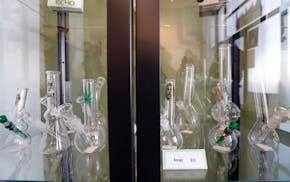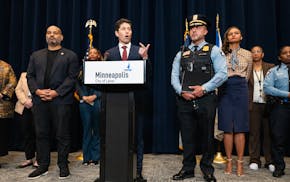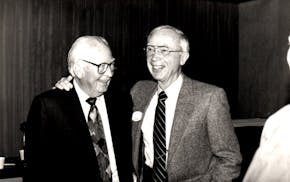Several nonprofits are competing to redevelop the "People's Way," a defunct Speedway gas station that serves as the protest headquarters of George Floyd Square.
Whoever is chosen will exert tremendous influence over the direction of the entire fractious intersection, which is still viewed worldwide as a barometer of how much Minneapolis has healed from the events of 2020.
Five years ago, protesters took 38th Street and Chicago Avenue hostage in the wake of Floyd's murder, demanding the city meet 24 demands for racial justice reform before they would cede back the street. George Floyd Square's Black business owners and churchgoers cried foul as the intersection turned into a gated "semiautonomous zone" barring regular traffic and police, complicating basic service delivery and creating conditions that benefited the endemic Bloods gang. Seven people, including a pregnant woman, were killed in the area in and around the square within two years after Floyd's murder.
Today, George Floyd Square is no longer the no-go zone it was in the aftermath of Floyd's murder by a Minneapolis police officer and the ensuing unrest, but deep disagreements over its future persist.
Elected officials remain at loggerheads over the street design, and competing visions have emerged within the activist community that still gathers there daily.
Perspectives are generally split between those who don't want to stop protesting before they've gotten systemic reforms, and those who want investment in 38th and Chicago's historic Black business district after decades of neglect.
"Our interest is in making sure that the story is immortalized, that what happened is never forgotten, not only in terms of the police murder of George Floyd and the circumstances surrounding it, but the international reaction to that," said Marquita Stephens, president of Urban League Twin Cities. "It's a once-in-a-lifetime kind of a thing."
A holding pattern
These days, 38th and Chicago has resumed a measure of normalcy. Police no longer treat it as a no-go zone. Activists don't employ Czech hedgehogs and cattle gates to control who drives in and out anymore.
Yet, giant fist sculptures still demarcate the boundaries of George Floyd Square, forming an unauthorized traffic circle at the intersection of 38th and Chicago. Memorial art and plantings proliferate the site. Cars drive through; buses haven't returned.
George Floyd Square protesters still retain influence. They recently called a news conference to push back on Mayor Jacob Frey's plan for reconstructing the streets. A supermajority of the City Council overrode a mayoral veto to further study permanent closure of Chicago Avenue in front of the People's Way.
Looming over the squaretoday is sense of waiting for something transformative to lift the economically depressed corner into something like nearby 48th and Chicago, a vivacious and prettily maintained cluster of small businesses on the bus line.
People call George Floyd Square a tourist destination, but the tourists only come in the summer and there's practically no local traffic, said Dwight Alexander, owner of Smoke in the Pit restaurant.
"When you come up here, it's a sad place. You're paying respect to a dead man, you think about all the hurt that happens in the world, what's going on in your life," said Alexander. "I see tumbleweeds sometimes walking down the street."
On a recent weekday, one of the square's liveliest businesses was the Giant Express Laundromat, where locals watched the weather report on TV while waiting for their clothes to spin.
Things have been noticeably quieter since the feds cracked down on the local Bloods, said laundromat worker Richard Culver. But the restaurant space opposite the alley where they've long held court remains empty. He doesn't have much faith that an ambitious redevelopment of 38th and Chicago would be useful to anybody when existing vacancies persist.
"Put the neighborhood back the way it was," he suggested. "Open the street back up, with the buses back."
Remembrance and rebirth
Minneapolis laid plans to demolish the People's Way in 2023, when it purchased the property for redevelopment. This summer, following years of arduous community meetings framed as collective planning for the future of 38th and Chicago, the city is expected to name its preferred developer — one of three nonprofit entities with diametrically different ideas and budgets.
One contender represents activists who once held the intersection down in direct defiance of the city. Another is the violence prevention group thatFrey's administration hired as muscle to reopen it to traffic.
City officials hope the winning bid will help cut through the political paralysis.
What are the chances that, after reviewing the three finalists, the city would pick the activist group to immortalize their protest through the next iteration of the People's Way?
"Yeah, that's part of the question," said local musician Raycurt Johnson of the Brass Solidarity band. He backs the protesters' proposal for a permanent memorial garden.
"Who is the city?" he asked. "If the people have decided how it should function, then the city should go along with it."
The competing proposals
The expectations for redevelopment are high, but so are the practical difficulties.
In its call for applications, the city enumerated these basic goals:
Whatever goes in place of the People's Way should honor Floyd's life, hold space for reflection on racial justice and boost the economic vitality of the community.
The chosen developer also needs to have legitimate experience and financial qualifications.
City staff were supposed to recommend a finalist this month, but the decision was postponed to later this summer after a front-runner, Urban League Twin Cities, pulled its application for a George Floyd Museum, citing concerns around financial viability.
"If there's not going to be any city resources, this project is going to be very unfeasible," said P.J. Hill, a member of the Urban League team who owns commercial property at 38th and Chicago that has long been challenging to lease.
"[People] perceive the area as dangerous when it's not anymore," said Hill. "There is no true foot traffic. I've seen everybody's financials. They always go under."
Big names had been assembled behind the Urban League team, including Noor Cos., Minnesota's largest woman- and minority-owned general contractor, and LSE Architects, the Black-owned firm recently hired to redesign the burned former Third Precinct police station.
Here are the three finalists still in the race:
Rise and Remember
Rise and Remember is led by activist Jeanelle Austin and Floyd's family members Angela Harrelson (an aunt) and Paris Stevens (a cousin). Formerly known as George Floyd Global Memorial, it plays host to a large anniversary block party at George Floyd Square every year and reported nearly $1 million in revenue in 2023.
The group's proposal is the most financially modest, envisioning a $2.5 million memorial garden and greenhouse. The plan incorporates professional art conservation of the miscellaneous offerings that visitors have left at Floyd's sprawling memorial in front of the Cup Foods grocery store over the years.
Agape
Minnesota Agape Movement, a violence-prevention group, includes ex-gang members. It became a tax-exempt nonprofit in 2021, a status revoked in 2023 and reinstated last February. It has not yet disclosed its financials in required public tax filings. Agape has an established business relationship with the city. In 2021, Frey gave the group a noncompetitive $359,000 contract to forcibly reopen the square against the activists' wishes.
Agape has envisioned a six-story building replete with revenue-generating elements including multiple eateries, a museum, affordable business incubator, music studio and a rooftop garden, which developer Victoria Yepez estimated at $20-35 million.
It's not clear how polished the proposal is, though. Agape spokesperson Bridgette Stewart presented its renderings as merely a placeholder to satisfy the city's application process, and "not our intentions." She said Agape will conduct public engagement and focus groups to create a community-cosigned idea.
P3 Foundation
P3 Foundation runs a south Minneapolis community center called David's Place. It has proposed a recreation center with art studios and a business incubator. The organization became a tax-exempt organization in December, after the city issued its call for applications. David's Place's website is defunct, and calls go straight to voicemail.
The city would ultimately sell the property to its preferred developer following a public hearing and approval by the mayor and City Council. Many things remain unclear, including how much the city will sell the site for, how much it would cost to remediate the former gas station and what financial assistance, if any, the city will contribute.
Coon Rapids police fatally shoot man during domestic dispute, officials say

Dirty bong water to be decriminalized in Minnesota
Judge orders University of Minnesota international student to be released from ICE custody

U.S. seeks to dismiss consent decree on Minneapolis police reforms
